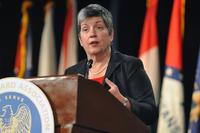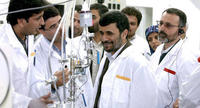-
Smart system to teach itself to jam new wireless threats
As wireless communication devices become more adaptive and responsive to their environment by using technology such as Dynamic Spectrum Allocation, the effectiveness of fixed countermeasures may become severely degraded; DARPA wants smart system that can learn to jam new wireless threats automatically
-
-
China makes Skype illegal
China announced that it had made illegal the use of Skype, the popular internet telephony service, as the country continues to shut itself off from the rest of the world
-
-
U.S. federal investment in cybersecurity to reach $13.3 billion by 2015
U.S. federal investment in information security will rise from $8.6 billion in 2010 to $13.3 billion by 2015 at a compound annual growth rate of 9.1 percent, nearly twice the rate of overall federal IT spending
-
-
Pentagon revamps security in wake of Wikileaks
There are 2.2 million people in the United States with access to one or more levels (confidential, secret, and top secret) of classified information; there are 854,000 people with top secret clearances — of which 265,000 are contractors; the 9/11 Commission recommended more sharing of information among agencies — but critics say that too much sharing is as risky as too little sharing
-
-
Government secrecy harder to maintain in the Internet age
Among the likely consequences of WikiLeaks: threats of prosecution under the Espionage Act; proposed legislation that would make it illegal to publish the names of military or intelligence community informants; increased use of subpoena power to compel journalists to disclose confidential sources; the mainstream media, already experiencing an ongoing financial crisis, may be dissuaded from starting and continuing the long and expensive battle to obtain information that officials want to keep secret
-
-
Half of India's critical infrastructure providers cyber attack victims
Symantec’s 2010 Critical Infrastructure Protection (CIP) Survey findings reveal that nearly 50 percent of India’s critical infrastructure providers are victims of cyber attacks; the attacks are said to have become more frequent and increasingly effective
-
-
Germany reports "sharp rise" in China-originated cyberattacks
Germany detected a sharp rise in serious cyberattacks in 2010; in the first nine months of 2010 there were some 1,600 such attacks recorded, compared to around 900 for the whole of 2009, plus most likely a considerable number that went undetected; Interior Ministry spokesman: “Germany is a very high-tech country with considerable experience and know-how, so of course others will naturally try to get hold of this knowledge—- China is playing a large role in this”
-
-
Mobile phone forensic tools to reduce hi-tech crimes
Government funded technology center in India is developing a set of mobile forensic tools that will assist the law enforcement agencies in cracking unlawful activities committed using mobile phones; the center is a government agency, and will be able to provide the tools at reasonable cost
-
-
Napolitano asserts DHS cybersecurity leadership

Cybersecurity should be led by DHS and not left to the market or the military, DHS secretary Janet Napolitano said; this year, DHS has expanded partnerships with private industry and worked to build up liaisons with private sector industries it deems to be “critical”; DHS has also improved its partnerships with military and military intelligence this year; in October, DHS and the Department of Defense signed a cybersecurity pact to improve collaboration between the agencies and boost DHS’s encryption and decryption capabilities by co-mingling National Security Agency (NSA) cryptologic analysts and DHS cybersecurity leadership in a move that signaled progress in a sometimes uneasy relationship with the military
-
-
Stuxnet virus set back Iran's nuclear weapons program by two years: Langner
Ralph Langner, top German computer security expert and the leading authority on Stuxnet, says Stuxnet was as effective in disrupting Iran’s nuclear weapons program as a direct military strike — but without any fatalities; the malware has set back the Iranian program by two years; expert says the Israeli military was the likely creator of the virus
-
-
WikiLeaks exposes tensions between "need to know" and "need to share"
The WikiLeaks posting of stolen classified information has highlighted the tension between the strategy of “share to win” and the necessity to enforce “need to know”; share to win refers to the idea of getting information and intelligence out to the personnel who need it; need to know is about how information is shared, who has the information, for what purposes and for what period of time
-
-
Lawmakers urge Obama to expand State Department's cybercrime reach
Lawmakers call President Obama to expand the U.S. State Department’s foreign policy mechanisms to address crime and security on the Internet; Senator Kirsten Gillibrand (D-New York) joined with Senator Orrin Hatch (R-Utah) to author the International Cybercrime Reporting and Cooperation Act; this bill will hold foreign countries accountable for cybercrime committed on their soil
-
-
Senate bill would require minimum cybersecurity standards for Internet
Senator Benjamin Cardin (D-Maryland) has introduced a bill that would require the U.S. government to work with the private sector to propose minimum standards for internet and cybersecurity safety; “Just as automobiles cannot be sold or operated on public highways without meeting certain minimum safety standards, we also need minimum Internet and cybersecurity safety standards for our information superhighway,” Cardin said
-
-
Former Goldman-Sachs programmer convicted of stealing source code
A former Goldman-Sachs programmer faces fifteen years in prison after being convicted Friday of stealing the company’s high-frequency trade technology; the programmer was convicted of stealing the source code for Goldman-Sachs’ high-frequency trade technology — a market trading system described by Futures Magazine as “like day-trading on near fatal doses of amphetamines”
-
-
Experts: Stuxnet worm wreaks havoc at Iran's nuclear sites

Iran’s nuclear program is still in chaos as a result of the Stuxnet attack; the American and European experts say their security Web sites, which deal with the computer worm known as Stuxnet, continue to be swamped with traffic from Tehran and other places in the Islamic Republic, an indication that the worm continues to infect the computers at Iran’s two nuclear sites; Stuxnet was designed to take over the control systems and evade detection, and it apparently was very successful; last week President Mahmoud Ahmadinejad, after months of denials, admitted that the worm had penetrated Iran’s nuclear sites, but he said it was detected and controlled; the second part of that claim, experts say, does not ring true
-
More headlines
The long view
What Does Netflix’s Drama “Adolescence” Tell Us About Incels and the Manosphere?
While Netflix’s psychological crime drama ‘Adolescence’ is a work of fiction, its themes offer insight into the very real and troubling rise of the incel and manosphere culture online.
Confronting Core Problems in Cybersecurity
It’s common for governors and mayors to declare a state of emergency and activate the National Guard in the aftermath of hurricanes, tornadoes, and other natural disasters. But last month, officials in Minnesota took these steps in the wake of a major cyberattack on the city of St. Paul —a testament to how disruptive these attacks have become.
Voting from Your Sofa Is Secure Enough – but Will It Be Allowed?
A new electronic voting system developed at NTNU can withstand attacks from quantum computers, meaning digital elections can be conducted securely, even in the future.
